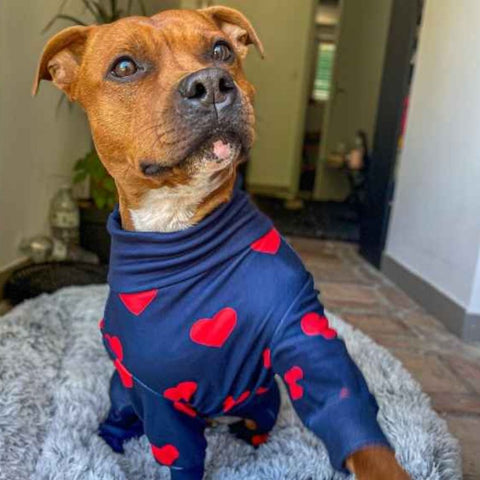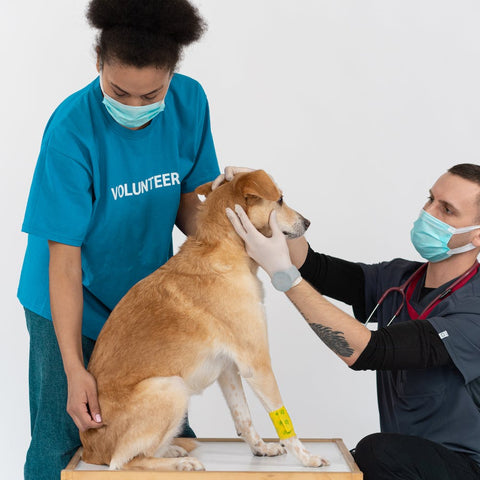How To Treat A Dog With A Cold
I hate getting a cold.
No, it’s probably not going to kill me, but the irritation of dealing with a runny nose, sore throat, and throbbing headache is something that I despise.
A cold isn’t one specific disease or virus. It’s usually a combination of 2 or more viruses (of which there are about 200) that work together and all have similar symptoms on its unfortunate host. (1)
Interestingly enough, a dog’s cold symptoms are very similar to those that we as humans have to deal with.
So let’s have a closer look at some of the cold-like symptoms that your dog might experience and what you as a pet parent can do to help your dog cope with his illness.

Common Cold Symptoms
Your dog’s symptoms may mirror the cold symptoms that you experience from time to time:
Coughing
If your dog has a cold, they may develop a dry, hacking cough. This cough can be persistent and may worsen when they're active or excited. It's their body's way of trying to clear their airways of any mucus or irritation.
Sneezing
Just like in humans, sneezing in dogs is a reflex to expel irritants from their nasal passages. If your dog is sneezing frequently, it could be a sign of a cold or allergies. Sneezing helps clear the nasal passages and relieve irritation.
Blocked and Runny Nose
A cold in dogs can cause nasal congestion, leading to a blocked or stuffy nose.
You might notice your dog having difficulty breathing through their nose, and they may snort or sniffle as they try to clear their airways. Your dog’s nose may also become runny, with discharge ranging from clear to thick mucus, depending on the severity of the infection.
Watery Eyes
Cold viruses can also affect the eyes, causing them to become watery and possibly red or inflamed.
This could be due to irritation from nasal discharge dripping down the back of the throat or from the virus directly affecting the eye membranes. Watery eyes in dogs can be uncomfortable and may cause them to paw at their eyes or rub their face against surfaces.
Treating Your Dog’s Cold Symptoms
The first thing to do if you expect that your dog has a cold is to contact your local vet.
After a quick examination, your vet will be able to give you a diagnosis and treatment options, targeting the specific flu viruses that your dog is suffering from.
If, for whatever reason, seeing a vet isn’t something you’re able to do, don’t worry. Most cold-like symptoms are only temporary and managed without veterinary treatment. However it is, make sure that your dog gets all the pampering it deserves if it’s come down with canine flu.
Keep them warm and dry. Dog pyjama onesies are great for keeping your furry friend as snug as a bug when it's feeling under the weather.

For the coziest and most stylish options, check out SparkPaws' collection of adorable dog pyjama onesies – the perfect way to ensure your pet stays warm and comfortable during the recovery period.
Also, make sure your dog gets a lot of rest. Postpone play dates and cancel trips to the dog park. Adequate rest will allow any medication prescribed by your vet to take effect and start healing your four-legged buddy.
Keep a close eye on your dog, if it seems like he has some other viruses that have caused an upset stomach or induced vomiting, you need to supply more water than usual to keep your dog hydrated.
A cool mist humidifier will be especially helpful if your dog stays indoors as the moist air will help your dog with the build-up of mucus in its nasal cavities. This will promote the overall comfort of your sick pup.
When using a humidifier for your dog, remember to clean it regularly to prevent the build-up of mould and bacteria, which could worsen respiratory symptoms.
It’s Not A Cold, It’s…
There are a host of viruses that all have more or less the same symptoms, so if you’ve confused one of the following viruses for a common dog cold, you’re forgiven.
Kennel Cough
A highly infectious disease that many dogs suffer from is kennel cough. This virus gets its name from one of the most common places where dogs pick this disease up… In dog kennels.
It’s in these confined spaces where movement is restricted that dogs share a lot of these infectious diseases and viruses. It is characterised by inflammation of the upper airways, including the trachea (windpipe) and bronchi (large airways in the lungs).
Symptoms to look out for include a harsh, dry cough that can sound like honking or hacking. The cough may be triggered by excitement, exercise, or pressure on the trachea, such as when pulling on a leash.
Some dogs with kennel cough may also exhibit sneezing and have a runny or stuffy nose. The nasal discharge is often clear but can become thicker and more mucoid as the infection progresses. In some cases, dogs with kennel cough may develop a slight fever, although this is not always present.
Canine Influenza

Canine influenza is caused by two main strains of the influenza A virus: H3N8 and H3N2.
These viruses can cause respiratory illness in dogs, including coughing, sneezing, nasal discharge, fever, lethargy, and loss of appetite. The virus can spread rapidly among dogs, particularly in environments where dogs are in close contact with each other, such as boarding facilities, dog parks, and animal shelters.
The symptoms of canine influenza can be similar to those of kennel cough, but the cough associated with this cold virus is often more severe and can persist for several weeks.
Canine Coronavirus
Another disease in dogs that can present symptoms similar to a cold is canine respiratory coronavirus. Canine respiratory coronavirus is a viral infection that affects the respiratory system, primarily the upper respiratory tract, including the nasal passages and throat.
These are three of the main causes that cause upper respiratory symptoms in dogs, but there are still many other fungal or bacterial infections that can be the root of your dog's illness.
So if you think your dog might be developing kennel cough or a similar virus, speak to your pet’s veterinarian as soon as you can. Make sure your pet stays hydrated when it’s sick, especially if it's a senior dog as its immune system might already be compromised.
Can I Get A Cold From My Dog?
While it's rare for humans to catch a cold from their dogs, it's not impossible.
The viruses that cause the common cold in humans are typically different from those that affect dogs. However, some respiratory infections can be transmitted between humans and dogs, albeit uncommonly.
For example, certain strains of influenza viruses, such as H1N1 (swine flu) and H3N2 (canine influenza), have been known to infect both humans and dogs. Transmission of these viruses between species usually occurs in settings where there is close contact between infected humans and dogs.
However, such cases are relatively rare, and most people who contract the flu do so from other humans, not from their pets.
Here are some of the most frequently asked questions that dog owners have when it comes to their pet's cold symptoms:
What medicine can I give my dog for a cold?
For treating a cold in your dog, it's crucial to consult with your veterinarian.
They can prescribe medications tailored to your dog's specific condition and needs. It's important not to give your dog any over-the-counter medications meant for humans without veterinary approval, as they can be harmful or ineffective for dogs.
Can a dog get over a cold on its own?
Dogs can sometimes overcome a cold on their own, especially if it's mild.
However, if your dog's symptoms persist or worsen, it's best to seek veterinary care. Additionally, if your dog is showing signs of more severe illness such as difficulty breathing or lethargy, prompt veterinary attention is necessary to ensure proper diagnosis and treatment.
How can I tell if my dog has a cold?
Recognizing a cold in your dog can be challenging because symptoms can vary.
Look out for signs such as coughing, sneezing, nasal discharge, and lethargy. If your dog has been around other dogs recently, particularly in group settings like kennels, and is exhibiting these symptoms, it's essential to consider the possibility of kennel cough and consult your vet for proper diagnosis and treatment.

Conclusion
Most of the cold symptoms that plague us humans from time to time also feature in a dog's life. And just like the common cold generally passes by us without leaving permanent damage, your dog’s cold will soon be a distant memory.
While serious measures like the canine influenza vaccine are readily available at any good veterinarian, the best thing is often to simply make your dog as comfortable as possible while he or she rides out the mucus and phlegm.
Article Sources: